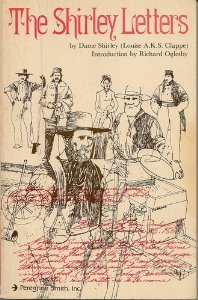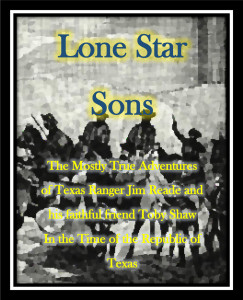The feud between the Suttons and the Taylors was one of those epic Texas feuds which convulsed DeWitt County in the decade following the Civil War. It might even have begun earlier in a somewhat more restrained way, but there is nothing besides speculation on the part of contemporary journalists by way of evidence. Both families originated in South Carolina, both settled in DeWitt County … and in the hard times which followed on the humiliating defeat of the South and the even more humiliating Reconstruction, they squared off against each other. The feud lasted nearly a decade, at a cost of at least 35 lives. Participants in it included the notorious John Wesley Hardin, who was related by marriage to the Taylors. Some historians have described the feud as a bitter continuation of the Civil War, between die-hard Confederate partisans and those roughly aligned with the forces of Reconstruction law and order.
The Taylor paterfamilias was Pitkin Taylor, whose brother Creed had fought in every significant skirmish and war going in Texas, from the Come and Take It Fight at Gonzales (at the age of 15) through the Texas Revolution, several rounds with Jack Hays’ Rangers, the Mexican War, and the Civil War and managed to die of ripe old age in 1906. Creed managed to survive the feud, relatively unscathed; likely his survival instincts were honed to an uncanny degree by the time that he was middle-aged. The Taylors were a prolific family; Creed and Pitkin were of a family of nine children, a clan later enlarged by marriage. They prospered – in between wars – although it was later whispered that Creed and Pitkin’s sons were not all together scrupulous regarding ownership of stray cattle and horses, and were in fact the local royal family of horse and cattle rustling.
On the other side was ex-Confederate soldier William Sutton, his brother James and their connections by kin and friendship in DeWitt County. William Sutton was elected as a deputy sheriff in Clinton, Texas, and served in the Texas state police force which enforced law during Reconstruction, which might have set him and his against more stiff-necked ex-Confederates. It is speculated that the initial bad blood might have come from a dispute between the two regarding unbranded cattle, which were free for the taking for the first person to slap a brand on a maverick. Or perhaps a Taylor took exception to a Unionist who refused to do business with pro-Confederate families. Or maybe it was a Taylor lifting cattle from a widow, and William Sutton took it upon himself to be her champion. Perhaps it was when Creed’s sons got into a fatal altercation with two Union soldiers outside a Mason County saloon … or when one of Creed Taylor’s nephews called William Sutton a horse thief – and Sutton riposted with fatal gunfire. Whatever the proximate cause, by 1869 the bad blood was already an established fact, since sufficient of it had been spilled.
It had not taken long for William Sutton as a deputy sheriff to run up against the Taylors anyway; in arresting one Charley Taylor for horse thievery in March of 1868 it had come down to gunplay, leaving Charley Taylor dead. Again, Sutton clashed with two more Taylor kinsmen in a saloon in Clinton on Christmas Eve after an argument regarding the questionable sale of some horses. The following summer, Sutton allies clashed with Creed Taylor’s son Jack Hays Taylor after the latter had repeatedly made a nuisance of himself in town. Further fuel was tossed on the fire when William Sutton was appointed to the Texas State Police by the Reconstruction governor Edmund Davis.
One of the Sutton’s close associates in that organization was a lawman – or at least, he represented himself to be that – named John Jack Helms (or Jack Helm), formerly the sheriff of DeWitt County, who had already a reputation as a vigilante involved in the hanging of pro-Unionist Texans at Gainesville. Without missing a beat, Jack Helm became a leading ‘Regulator’ (that is a vigilante motivated to ‘regulate’ the conduct of others) and a captain in the Texas State Police Force. He and William Sutton were primarily tasked with enforcing the policies of Reconstruction. As expected, state police efforts did not prove overwhelmingly popular amongst the citizenry in south Texas– especially as Helm’s unit had the dismaying tendency to hunt down and capture wanted men, and then mysteriously return without them, since they had been ‘shot while attempting to to escape.’
Late in August, 1870, Henry and William Kelly, sons-in-law of Pitkin Taylor were arrested by a Helms-Sutton posse on a fairly minor charge. They were taken a few miles from their homes and executed. Unknown to the posse, Mrs. Henry Kelly had followed after, and watched the whole scene from hiding. Jack Helms was dismissed from the state police after this and other outrages, although he continued as county sheriff. The feud simmered away in a welter of suspicion and resentments for the next two years, erupting into the ambush murder of Pitkin Taylor. The old man was lured out of his house and into a neighboring cornfield by someone ringing a cowbell. Then he was ambushed and shot, dying of his injuries six months later. At his funeral, his son Jim Taylor vowed vengeance on the Suttons. William Sutton was drinking in a saloon in Cuero when he was shot at through the open door and injured slightly. He barely escaped another ambush a few months later. In the summer of 1873 two Sutton adherents were ambushed and gunned down near Tumlinson Creek. John Wesley Hardin may have been involved in that incident – and he most certainly was front and center in a gunfight in the streets of Cuero, where he killed a DeWitt County deputy – and later the same day he and Jim Taylor gunned down Jack Helms in front of a blacksmith shop in the tiny hamlet of Albuquerque. Hardin held off the townsfolk with a pair of six-shooters while Jim Taylor dispatched the unarmed Jack Helms.
A brief truce negotiated by law enforcement between the two factions held only until the end of the year, when the tit-for-tat killings began again. At that point, William Sutton seems to have had enough. He made arrangements to leave for good. He and a good friend, with their wives traveled to Indianola in March, 1874. They had actually boarded the steamer when Jim and Billy Taylor appeared on the dock and gunned down Sutton and his friend as their wives watched in horror.
Billy Taylor was arrested at once, and Mrs. Sutton pledged a hefty reward for the arrest of Jim – and this was when Leander McNelly’s Ranger company was sent in, as the degree of violence had become completely unacceptable. The Sutton faction threatened that if justice wasn’t done by the court to their satisfaction, they would see that it was. (Three Taylors charged with cattle theft at this time were taken out of the Clinton town jail and summarily executed.) McNelly and his men did what they could to tamp down the violence, serve writs on suspected ringleaders and protect the lives of various witnesses. The peace only lasted as long as McNelly and his men were present. With Billy Taylor set to be tried for murder in September, Indianola was crowded with spectators and reporters. On September 15th a massive hurricane hit the low-lying town, and the jail-keeper released the prisoners from the jail and took them to the courthouse, which stood on a slight hillock. Many who survived the devastation caused by the rush of water from the lagoon in back of town which carried away much of the town found safe refuge there. By some accounts Billy Taylor risked his own life to rescue people from the storm rush. In the aftermath, he and another inmate escaped. (He was caught again, briefly jailed in Quero, but managed to get out of being charged. Reportedly, he went to Oklahoma and lived the remainder of his life in obscurity.)
But the steam wasn’t out of the feud entirely – a shoot-out in a saloon in Cuero took the life of Reuben Brown, city marshal and de facto leader of the Suttons at the hands of John Wesley Hardin and Jim Taylor and two of his friends died in a shoot-out in Clinton. A well-liked local doctor and his oldest son – an outlaw with a price on his head – were taken from the doctors’ home by a posse of masked men. The doctor and his son were coldly executed – and that brought the Texas Rangers again, this time a company commanded by Jesse Lee Hall, who had taken over when Leander McNelly resigned. Eventually eight men were charged in the murders, but after a series of legal wranglings over the next two decades, only one was convicted. And with the motivating leadership of both factions in the grave or exiled, and law and order being dispensed with a firm and impartial hand the feud was essentially done.
(Just for fun, I speculated on the origins of the Sutton-Taylor feud in my attempt to revitalize the Lone Ranger – here, here, and here. I’m off to Goliad Saturday morning, for their Christmas on the Square event. The road leads thru Cuero, which is very sleepy these days, although the shale oil discoveries have livened it up a bit.)



Recent Comments